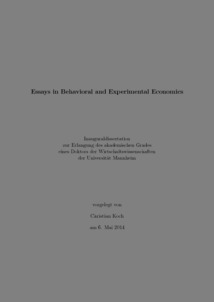|
Essays in behavioral and experimental economics
Koch, Christian
![[img]](https://madoc.bib.uni-mannheim.de/36775/1.hassmallThumbnailVersion/Doktorarbeit_CKoch.pdf)  Vorschau |
|
PDF
Doktorarbeit_CKoch.pdf
- Veröffentlichte Version
Download (2MB)
|
|
URL:
|
https://madoc.bib.uni-mannheim.de/36775
|
|
URN:
|
urn:nbn:de:bsz:180-madoc-367758
|
|
Dokumenttyp:
|
Dissertation
|
|
Erscheinungsjahr:
|
2014
|
|
Ort der Veröffentlichung:
|
Mannheim
|
|
Hochschule:
|
Universität Mannheim
|
|
Gutachter:
|
Engelmann, Dirk
|
|
Datum der mündl. Prüfung:
|
10 Juni 2014
|
|
Sprache der Veröffentlichung:
|
Englisch
|
|
Einrichtung:
|
Außerfakultäre Einrichtungen > GESS - CDSE (VWL)
Fakultät für Rechtswissenschaft und Volkswirtschaftslehre > VWL, Experimentelle Wirtschaftsforschung (Engelmann 2010-2014)
|
|
Fachgebiet:
|
330 Wirtschaft
|
|
Normierte Schlagwörter (SWD):
|
Altruismus , Glück , Lohnstarrheit , Auktion , Experiment
|
|
Freie Schlagwörter (Englisch):
|
social preferences , well-being , eudaimonia , wage rigidity , labor market , gift exchange , winner's curse , contigent reasoning , belief formation , experiment
|
|
Abstract:
|
This dissertation is driven by the idea that a better understanding of human behavior and human nature is often a prerequisite for a better understanding of many economic problems. I hope that considering psychological insights when analyzing economic problems increases the predictive power of the economic framework. It consists of three chapters and in all chapters the experimental method is used to analyze economic questions. In Chapter 2, I analyze a specific reason why people might behave pro-socially. Already Aristotle has claimed that there is a special link between long-run well-being and pro-social behavior. I design an experiment to investigate this link and find evidence that there seems to be a crucial connection between long-run well-being and pro-social behavior. In Chapter 3, I investigate which implications social preferences might have for the labor market. I analyze to what extent social preferences - or more precisely the reference dependence of social preferences - provide an explanation for wage rigidity, and my experimental data indeed supports this idea. In Chapter 4, I analyze whether people have difficulties with contingent reasoning on hypothetical events and whether this problem is at the origin of the so-called winner’s curse. My experimental data underpins this conjecture.
|
 | Dieser Eintrag ist Teil der Universitätsbibliographie. |
 | Das Dokument wird vom Publikationsserver der Universitätsbibliothek Mannheim bereitgestellt. |
 Suche Autoren in Suche Autoren in
Sie haben einen Fehler gefunden? Teilen Sie uns Ihren Korrekturwunsch bitte hier mit: E-Mail
Actions (login required)
 |
Eintrag anzeigen |
|
|
